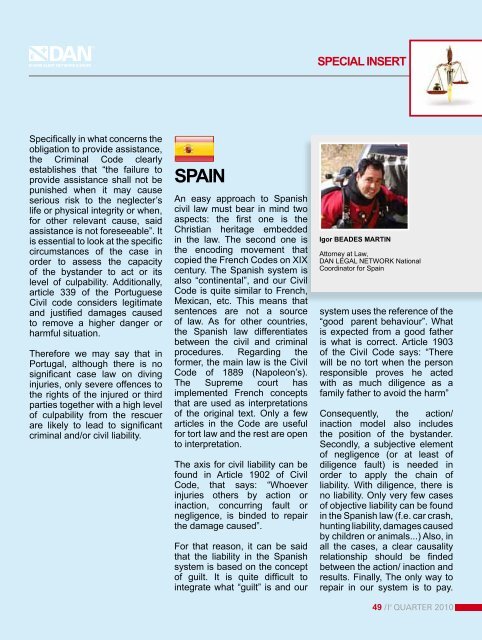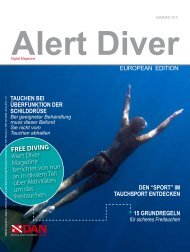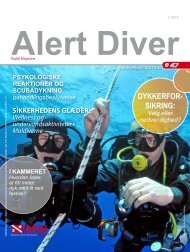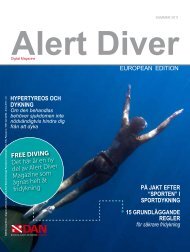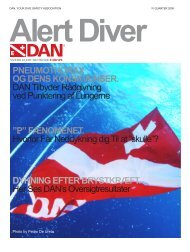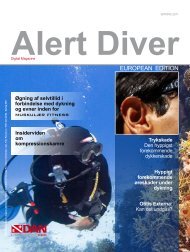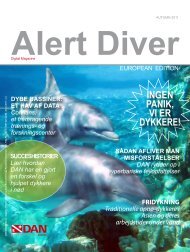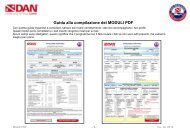Alert Diver - DAN Europe
Alert Diver - DAN Europe
Alert Diver - DAN Europe
You also want an ePaper? Increase the reach of your titles
YUMPU automatically turns print PDFs into web optimized ePapers that Google loves.
Specifically in what concerns the<br />
obligation to provide assistance,<br />
the Criminal Code clearly<br />
establishes that “the failure to<br />
provide assistance shall not be<br />
punished when it may cause<br />
serious risk to the neglecter’s<br />
life or physical integrity or when,<br />
for other relevant cause, said<br />
assistance is not foreseeable”. It<br />
is essential to look at the specific<br />
circumstances of the case in<br />
order to assess the capacity<br />
of the bystander to act or its<br />
level of culpability. Additionally,<br />
article 339 of the Portuguese<br />
Civil code considers legitimate<br />
and justified damages caused<br />
to remove a higher danger or<br />
harmful situation.<br />
Therefore we may say that in<br />
Portugal, although there is no<br />
significant case law on diving<br />
injuries, only severe offences to<br />
the rights of the injured or third<br />
parties together with a high level<br />
of culpability from the rescuer<br />
are likely to lead to significant<br />
criminal and/or civil liability.<br />
SPAIN<br />
An easy approach to Spanish<br />
civil law must bear in mind two<br />
aspects: the first one is the<br />
Christian heritage embedded<br />
in the law. The second one is<br />
the encoding movement that<br />
copied the French Codes on XIX<br />
century. The Spanish system is<br />
also “continental”, and our Civil<br />
Code is quite similar to French,<br />
Mexican, etc. This means that<br />
sentences are not a source<br />
of law. As for other countries,<br />
the Spanish law differentiates<br />
between the civil and criminal<br />
procedures. Regarding the<br />
former, the main law is the Civil<br />
Code of 1889 (Napoleon’s).<br />
The Supreme court has<br />
implemented French concepts<br />
that are used as interpretations<br />
of the original text. Only a few<br />
articles in the Code are useful<br />
for tort law and the rest are open<br />
to interpretation.<br />
The axis for civil liability can be<br />
found in Article 1902 of Civil<br />
Code, that says: “Whoever<br />
injuries others by action or<br />
inaction, concurring fault or<br />
negligence, is binded to repair<br />
the damage caused”.<br />
For that reason, it can be said<br />
that the liability in the Spanish<br />
system is based on the concept<br />
of guilt. It is quite difficult to<br />
integrate what “guilt” is and our<br />
SPECIAL INSERT<br />
Igor BEADES MARTIN<br />
Attorney at Law,<br />
<strong>DAN</strong> LEGAL NETWORK National<br />
Coordinator for Spain<br />
system uses the reference of the<br />
“good parent behaviour”. What<br />
is expected from a good father<br />
is what is correct. Article 1903<br />
of the Civil Code says: “There<br />
will be no tort when the person<br />
responsible proves he acted<br />
with as much diligence as a<br />
family father to avoid the harm”<br />
Consequently, the action/<br />
inaction model also includes<br />
the position of the bystander.<br />
Secondly, a subjective element<br />
of negligence (or at least of<br />
diligence fault) is needed in<br />
order to apply the chain of<br />
liability. With diligence, there is<br />
no liability. Only very few cases<br />
of objective liability can be found<br />
in the Spanish law (f.e. car crash,<br />
hunting liability, damages caused<br />
by children or animals...) Also, in<br />
all the cases, a clear causality<br />
relationship should be finded<br />
between the action/ inaction and<br />
results. Finally, The only way to<br />
repair in our system is to pay.<br />
49 /


